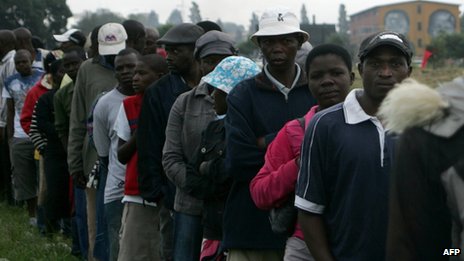The European Union has suspended sanctions against 81 officials and eight firms in Zimbabwe.

The decision followed a “peaceful, successful and credible” referendum on a new constitution earlier this month, the EU said in a statement.
However, sanctions will remain in force against 10 people – including Zimbabwe’s President Robert Mugabe – and two firms, EU sources say.
The EU imposed sanctions, including a travel ban, in 2002.
It said it was in response to human rights abuses and political violence under Mr Mugabe’s rule.
Allies of Mr Mugabe have long argued that the sanctions should be unconditionally removed and that they have had a negative impact on Zimbabwe’s economy.
Mr Mugabe, 89, and his rival, Prime Minister Morgan Tsvangirai, 61, have been sharing power since disputed elections marred by violence in 2008.
Zimbabweans overwhelmingly approved the new constitution – which expands civil liberties and has been endorsed by both Mr Mugabe and Mr Tsvangirai – in the 16 March referendum.
Fresh elections are expected to be held some time this year.
‘Worrying signs’
The 27-member European Union said it had agreed to “immediately suspend” restrictive measures against 81 individuals and eight entities.
“The EU congratulates the people of Zimbabwe on a peaceful, successful and credible vote to approve a new constitution,” the EU said in a statement, adding that it “represents a significant step” towards general elections.
But it said “key decision makers” would remain subject to sanctions until peaceful, transparent and credible elections have been achieved.
Lifting the sanctions on all but 10 individuals and two firms is clearly intended to encourage further political progress as well as demonstrate continuing concern, the BBC’s world affairs correspondent Mike Wooldridge reports.
The EU says it welcomes the repeated calls for reconciliation and peaceful political activity made by Zimbabwean political leaders, but is also concerned over the recent reports of intimidation and harassment against some political activists and civil society representatives, he adds.
Earlier on Monday, a court in Zimbabwe granted bail to prominent lawyer Beatrice Mtetwa, who was detained a day after the referendum.
She was charged with obstructing justice after she intervened in a raid on the offices of Mr Tsvangirai’s Movement for Democratic Change (MDC) in which three computers are alleged to have gone missing.
Four MDC members were also arrested during the raid.
They all deny the charges and say they were compiling information on corruption.
Allies of Morgan Tsvangirai say the arrests are a sign that critics of President Mugabe will face intimidation ahead of the elections.
Both men – who have repeatedly called for a peaceful poll – are expected to be the main contenders in the presidential election.





